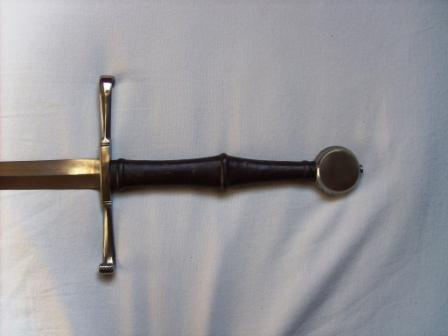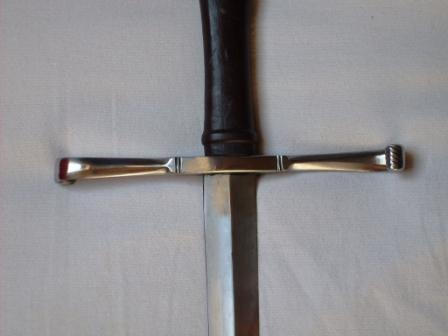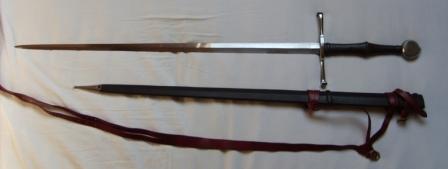First of all, this is my first review. I hope everything is clear, I fear some of my sentences won't be correct because english isn't my first language. My photography is even worse. If someone wishes, I will make some pictures in natural daylight which may be better.
Arma Bohemia is a Czech Living History and Reenactment shop. They have a huge catalog of all kinds of weapons and everything can be made. As I read they usually work with other makers. I ordered a copy of the Cluny sword in october 2008, the sword arrived in april 2010. The normal waiting time was six months. The blade that was sent to them was not of the desired quality when hardened so it had to be sent back. The workshop where the sword was made was flooded and some parts were lost. Sometimes it took a while to get an answer by email, since they also have to wait for their makers to answer. When they had the sword, sent pictures and I asked for some minor changes, they answered my mails at once. It seems that they only answer when they have an answer, sometimes annoying but quite logic.
I ordered the sword as a copy of the hand and half sword in the Cluny museum. The one they had made before was a blunt one so they couldn't give exact specs. They promised a sword with the POB about 5 cm from the guard. That sounded awesome, but it is even better.
When they received the sword, they sent pictures and I requested some changes to the finish, guard and pommel. All were made without any problems or extra costs. When ready it was packed well and shipped fast. When I received it I wasn't completely satisfied with the sharpening of the blade. Arma Bohemia ordered a new blade, sent it to another grinder/polisher and changed the blade without extra cost.
The sword isn't an exact replica of the sword in the Cluny museum, the form of the blade is different, as the guard and grip. The markings on the side of the pommel are a bit different and there is no 'rainguard'. It could be it's still very beautiful sister.
Measurements:
Weight: 1398 g
Overall length: 123cm
Blade length: 93 cm
Blade width: 3,5 cm at base
Grip length: 30 cm
Guard width: 24 cm
Point of Balance: 2cm from guard
Center of Percussion: 23,5 cm from guard
Oakeshott typology: Type XVIIIb blade, type G pommel, Style M guard
Handling characteristics:
This is an extremely light sword and it handles like a dream.It can be used with one hand without any problem. The balance is very good and makes the sword very fast.
The grip is waisted and thick enough to hold comfortably.
The blade is sharpened from guard to tip. There is no fuller so it is quite stiff.
The sword is sharp enough for test cutting but not paper cutting sharp.It cuts milk cartons and thin water bottles without problem. A small but thick coca cola bottle was to hard, the sword would cut into but not through it. I think this is normal considering the thin blade an low weight. It's thrusting abilities are wonderful, no problems whatsoever. I have no tatami or pool noodles so I have no idea what it would do on those.
Fit and Finish
The sword looks very good, all of seems to fit perfectly.
The guard is forged, Arma Bohemia says they use no cast steel. It has some slight imperfections, small scratches, some tiny holes but all those seem to form the character of the whole sword. It is not an exact replica of the original, but it looks good.
The leather of the grip is thicker than any other sharp swords I have but feels good. You can see the seam on the side but it doesn't bother. The risers are placed perfectly. The one closest to the guard keeps your hand from touching the guard. Which, in my experience, prevents the fingers being hit when the block isn't completely perfect.
The pommel is peened, forged and also has some minor imperfections, which I like. It is very large, this gives an unbelievable balance to the sword and seems right with the rest of the proportions of the sword.
The blade is handforged, you can see the very light hammer marks when looking over the blade. It does have a very small secondary edge.
The scabbard I ordered with the sword is wood covered with leather. It is well made and hold the blade well, though it would fall out when held upside down. The metal chappe is simple but nice.
Conclusion:
Arma Bohemia has made me the sword that I wanted, it looks and feels perfect. It is not the exact replica of the museum piece but has enough character of its own to be a beautiful handmade sword.
It cuts well for it's size and can do best what it's made for: stabbing.
Blunt
When Arma Bohemia finished the sword, they also had a blunt one made for WMA. I couldn't resist and bought it too. These are the specs:
Weight: 1424 g
Overall length: 122cm
Blade length: 93 cm
Blade width: 3,5 cm at base
Grip length: 29 cm
Guard width: 23,5 cm
Point of Balance: 4 cm from guard
Edge Thickness: 2 – 2,5 mm
Hardness: 50 HRC
This is the best sword I have ever handled in WMA training. The rest of my club agrees. The balance is amazing and gives it lots of speed. I have trained 1 ½ years with this sword and have filed the edges twice or thrice. Again, it looks and feels very good.
Jeroen Averhals



[ Download ]
[ Download ]
[ Download ]